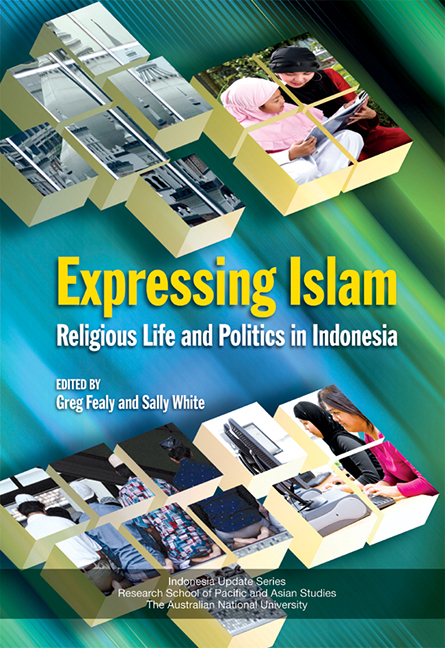Book contents
- Frontmatter
- Contents
- List of Figures and Tables
- List of Contributors
- Acknowledgments
- Glossary
- Map
- 1 Introduction
- PART I EXPRESSING PERSONAL PIETY
- PART II POLITICAL, SOCIAL AND LEGAL EXPRESSIONS OF ISLAM
- 7 Religion, Politics and Social Dynamics in Java: Historical and Contemporary Rhymes
- 8 Islam and Gender in Contemporary Indonesia: Public Discourses on Duties, Rights and Morality
- 9 Online Fatwa in Indonesia: From Fatwa Shopping to Googling a Kiai
- 10 Regional Sharia Regulations in Indonesia: Anomaly or Symptom?
- 11 ‘As Long as It's Halal’: Islamic Preman in Jakarta
- 12 Indonesian Terrorism: From Jihad to Dakwah?
- PART III THE ISLAMIC ECONOMY
- Index
- Indonesia Update Series
- Plate section
7 - Religion, Politics and Social Dynamics in Java: Historical and Contemporary Rhymes
from PART II - POLITICAL, SOCIAL AND LEGAL EXPRESSIONS OF ISLAM
Published online by Cambridge University Press: 21 October 2015
- Frontmatter
- Contents
- List of Figures and Tables
- List of Contributors
- Acknowledgments
- Glossary
- Map
- 1 Introduction
- PART I EXPRESSING PERSONAL PIETY
- PART II POLITICAL, SOCIAL AND LEGAL EXPRESSIONS OF ISLAM
- 7 Religion, Politics and Social Dynamics in Java: Historical and Contemporary Rhymes
- 8 Islam and Gender in Contemporary Indonesia: Public Discourses on Duties, Rights and Morality
- 9 Online Fatwa in Indonesia: From Fatwa Shopping to Googling a Kiai
- 10 Regional Sharia Regulations in Indonesia: Anomaly or Symptom?
- 11 ‘As Long as It's Halal’: Islamic Preman in Jakarta
- 12 Indonesian Terrorism: From Jihad to Dakwah?
- PART III THE ISLAMIC ECONOMY
- Index
- Indonesia Update Series
- Plate section
Summary
Mark Twain observed that history doesn't repeat itself, but sometimes it rhymes. In the spirit of that observation, this chapter will pursue the possibility of historical rhymes in the history of Islam in Java. I will first examine a crucial period in the late nineteenth and early twentieth centuries and then ask whether that period can shed light on the complex developments currently being experienced in religious affairs in Java, and on broader Indonesian issues.
Java's Islamisation began—so far as we can know from the surviving evidence—in the fourteenth century. By the late eighteenth and early nineteenth centuries, there had evolved a religious consensus that I have labelled the ‘mystic synthesis’. Within the general context of Sufism, this mystic synthesis had three characteristic features: (1) a strong sense of Islamic identity; (2) observance of the five pillars of the faith (the confession of faith, the five daily prayers, fasting during Ramadan, paying alms and performing the pilgrimage if one can afford to do so); but nevertheless (3) acceptance of the reality of multiple local spiritual forces. While evidence for this period relates mostly to the elite levels of society, what little material we have on commoners suggests that this mystic synthesis was found throughout Javanese society.
POLARISAT ION BEFORE INDEPENDENCE
In the period from 1830 to 1930, every element of this mystic synthesis came under challenge. Thereby, a society that—so far as we can judge from the surviving evidence—was united in its religious identity became one conflicted by contending religious identities. This happened as a result of the arrival of contending versions of modernity: on the one hand European-style modernity brought by the colonising power, and on the other global Islamic reform.
The Dutch were genuinely in control of Java only after their victory in the Java War in 1830. Thereafter they introduced one of the most exploitative colonial systems ever devised, the well-known cultuurstelsel (cultivation system). But while this brought hard times for many peasants, for members of the Javanese elite (priyayi) Dutch rule brought new opportunities, greater security, often greater wealth and a host of new ideas. Many members of the elite embraced these new styles and ideas with enthusiasm. It need hardly be said that, for those who found service in the Dutch regime rewarding, enthusiastic Islamic devotionalism held little attraction, for it could only threaten their careers in colonial service.
- Type
- Chapter
- Information
- Expressing IslamReligious Life and Politics in Indonesia, pp. 115 - 136Publisher: ISEAS–Yusof Ishak InstitutePrint publication year: 2008



